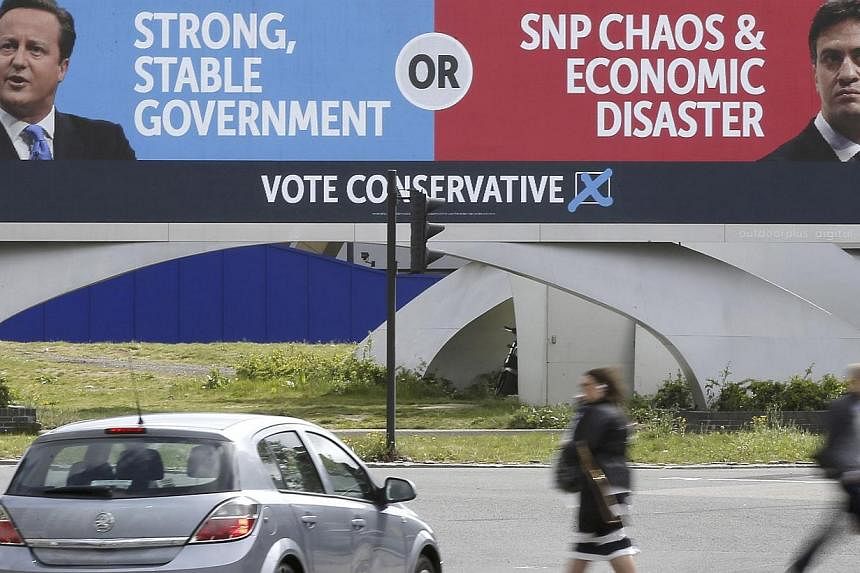LONDON (REUTERS) - Campaigning in Britain's most unpredictable election in a generation entered its final day with the two main parties level in most polls and neither on track to command a majority in the parliament of the world's fifth largest economy.
Despite five weeks of campaigning, neither Prime Minister David Cameron's Conservative party nor Ed Miliband's opposition Labour has a clear lead, teeing up a potentially messy and uncertain outcome after Thursday's vote.
The stakes are high because of a rare confluence of factors which mean Britain's future in the European Union, as well as its national cohesion, could hinge on the result.
Cameron has promised to hold a referendum on whether to stay in or quit the EU if he returns to power. And polls suggest Scottish nationalists could emerge as the third largest party, despite losing a plebiscite last year on whether Scotland should break away from the United Kingdom. "The consequences if you take a wrong turn could at its worst - and I'm not predicting this - mean that within a matter of years, two unions which are pivotal to the prosperity and way of life of everybody in Britain are lost," Nick Clegg, the deputy prime minister and Liberal Democrat leader, told Reuters during the campaign.
Five years ago, Britain got its first coalition government since World War Two when Cameron fell short of an overall majority and struck a deal with Clegg's centrist party to govern together to steady the economy.
Many Britons thought that was a one-off.
But the rise of fringe parties such as the pro-independence Scottish National Party and the anti-EU United Kingdom Independence Party (UKIP) has drained support from the two main parties.
A TNS opinion poll on Wednesday underscored how close the contest is, putting the Conservatives 1 point ahead of Labour, indicating neither of the major parties will win an overall majority in the 650-seat parliament.
Some politicians think the polls may be misleading.
Neil Kinnock, a former Labour Party leader, believes some voters are "shy" about telling pollsters how they will vote, something he learnt when he lost a 1992 election even though polls had put him narrowly ahead until voting day. "People who tell pollsters that they're not sure or they're not going to vote Conservative will, in the privacy of the ballot booth, say: 'To hell with it, I'll stick with what I know," Kinnock told the New Statesman magazine.
UKIP, which has spent much of the campaign fending off accusations of racism, was forced to suspend one of its candidates for threatening to "put a bullet" in his Conservative rival, a Briton of Asian origin, if he ever became prime minister.
The big party leaders have avoided game-changing gaffes but drawn mockery at times: Cameron for forgetting the name of his soccer team, and Miliband for engraving his campaign pledges on a giant stone, prompting ironic comparisons with Moses.
Cameron, who is banking on one of the strongest economic recoveries in the developed world to get him re-elected, was making his final pitch to voters on a two-day road trip.
Stagnant polls have prompted him to refine his message, blending the promise of higher living standards with a warning that Scottish nationalists could hold to ransom a minority Labour government, forcing it to borrow more and edge towards Scottish independence. "Tomorrow, the British people make their most important decision for a generation," Cameron was expected to say on Wednesday, according to his office.
Awkwardly for the prime minister, a leading think tank cut its forecast for Britain's economic growth in 2015 on Wednesday, though it said strong consumer spending should keep the recovery on track.
Labour's Miliband, who has put the future of the country's treasured but troubled health service at the heart of his campaign, will address a final rally in northern England on Wednesday evening. "This is the choice at the election: a Labour government that will put working people first or a government that will stand up only for a privileged few," he will say.
The tightness of the race has prompted some parties to try to define in advance what arrangements would constitute a legitimate government.
The rules state that any party capable of getting parliament's backing for its legislative slate can govern. But convention dictates that the party with the most seats has a first crack at trying to form an administration.
If the two main parties are separated by only a handful of seats, however, both may claim the right to govern, setting up potentially protracted standoff.
Britain's highly politicised press weighed in.
The Labour-supporting Daily Mirror warned its readers that Cameron would axe nurses at two thirds of hospitals, while the Conservative-supporting Sun ran an unflattering picture of Miliband eating a bacon sandwich. "Don't swallow his porkies and keep him out," it said.
More than 45 million Britons are eligible to vote on Thursday, when polls open from 0600 to 2100 GMT.

